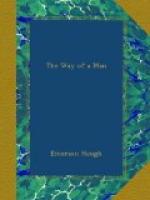“Very well, then,” I broke out, “I admit it! I did take notice of four different girls, one after the other—but it was because each of them was fit to wipe out the image of all the others—and of all the others in the world.”
This was going far. I was a young man. I urge no more excuse. I am setting down simply the truth, as I have promised.
The girl looked about, gladly, I thought, at the sound of a shuffling step approaching. “You, Aunt Mandy?” she called out. And to me, “I must say good-night, sir.”
I turned away moodily, and found the embers of the fire at my own camp. Not far away I could hear the stamp of horses, the occasional sound of low voices and of laughter, where some of the enlisted men were grouped upon the ground. The black blur made by the wagon stockade and a tent or so was visible against the lighter line of the waterway of the Platte. Night came down, brooding with its million stars. I could hear the voices of the wolves calling here and there. It was a scene wild and appealing. I was indeed, it seemed to me, in a strange new world, where all was young, where everything was beginning. Where was the old world I had left behind me?
I rolled into my blankets, but I could not sleep. The stars were too bright, the wind too full of words, the sweep of the sky too strong. I shifted the saddle under my head, and turned and turned, but I could not rest. I looked up again into the eye of my cold, reproving star.
But now, to my surprise and horror, when I looked into the eye of my monitor, my own eye would not waver nor admit subjection! I rebelled at my own conscience. I, John Cowles, had all my life been a strong man. I had wrestled with any who came, fought with any who asked it, matched with any man on any terms he named. Conflict was in my blood, and always I had fought blithely. But never with sweat like this on my forehead! Never with fear catching at my heart! Never with the agony of self-reproach assailing me! Now, to-night, I was meeting the strongest antagonist of all my life, the only one I had ever feared.
It was none other than I myself, that other John Cowles, young man, and now loose in the vast, free, garden of living.
Yet I fought with myself. I tried to banish her face from my heart—with all my might, and all my conscience, and all my remaining principles, I did try. I called up to mind my promises, my duties, my honor. But none of these would put her face away. I tried to forget the softness of her voice, the fragrance of her hair, the sweetness of her body once held in my arms, all the vague charm of woman, the enigma, the sphinx, the mystery-magnet of the world, the charm that has no analysis, that knows no formula; but I could not forget. A rage filled me against all the other men in the world. I have said I would set down the truth. The truth is that I longed to rise and roar in my throat, challenging all the other men in the world. In truth it was my wish to stride over there, just beyond, into the darkness, to take this woman by the shoulders and tell her what was in my blood and in my heart—even though I must tell her even in bitterness and self-reproach.




